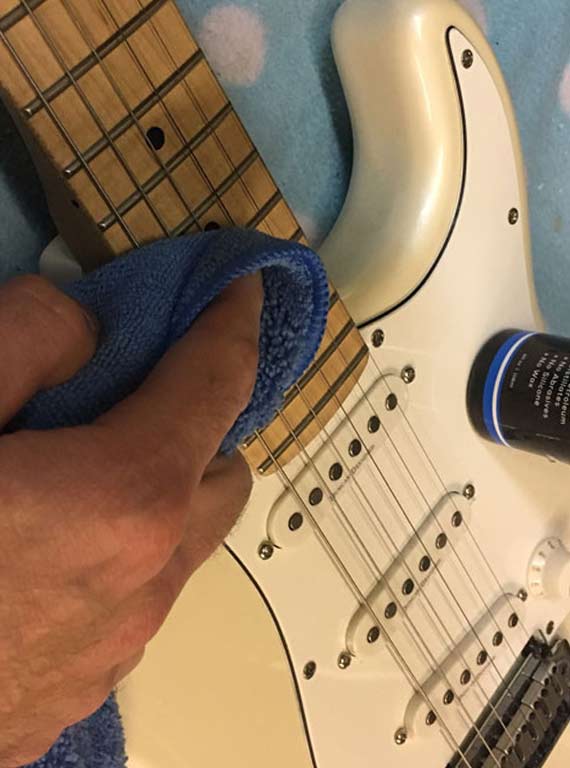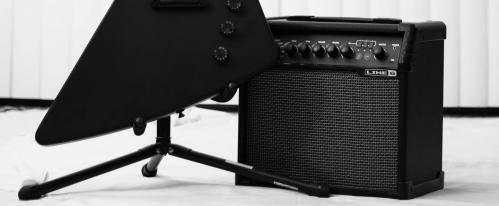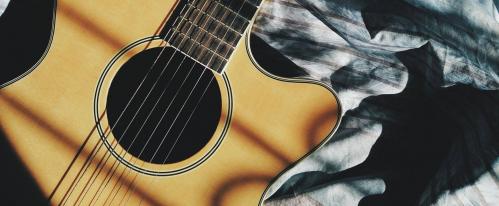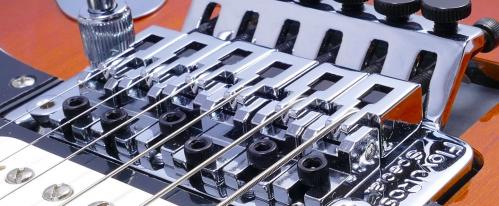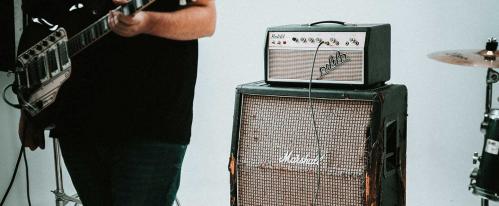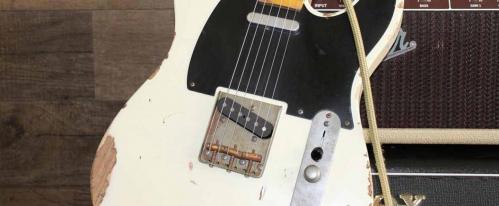We show you how to clean a guitar, what the best guitar cleaner is, how to clean a guitar fretboard and discuss why you need to keep on top of guitar maintenance
We get asked how to clean a guitar quite a lot here at PMT, so we thought we’d round up some top tips and show you the best ways to do it. In this blog, we’ll discuss how to clean a guitar from top to bottom, how to clean a fretboard including Maple and Rosewood, how to clean the strings and also why you should really keep on top of cleaning your guitar.
Why should I keep my guitar clean?
First things first; we need to look at WHY it’s so important to clean a guitar before we discuss HOW to clean a guitar. There are a few reasons we need to keep our guitar clean, and it’s not all down to how a guitar looks!
The oil from our skin, dust, sweat, smoke and even spilled drinks (we’ve all done it onstage!) all contribute to the “dirtying up” of our guitar. And although a dirty, well used guitar looks cool, if it’s dirty or full of gunk in the wrong places it can cause some serious damage to the inner workings and affect usability and playability of our guitar.
One of the worst things for our guitar is our skin! Yep, we’re pretty much toxic to our guitars.
Our skin creates oil and sweat which transfers over to the guitar whenever we play it. If we gig with our guitar regular and play under harsh lights on stage or get quite sweaty when we’re rehearsing, this sweat and moisture will eventually make it to our guitar effectively baking in to the wood! Unfortunately, this sweat is really bad for our instruments as it starts to erode your fretboard, hardware and finish over time.
It takes a long time, but it’s not good either way!
If you love your guitar, keep it clean
It’s just a fact that the more we play our guitars under harsh conditions such as stage lights or in hot rooms, the more we’re going to sweat. This means over time your finish may start to erode and chip away, hardware starts to rust and your fretboard would slowly become stained and full of gunk as it gets covered in your sweat, the spilled drinks or even the pints of fluid thrown at us from disgruntled gig-goers!
If you love your guitar, and want it to last a long time – keep it clean!
How Do I Stop My Guitar Getting Dirty?
Now we’re not suggesting that you shouldn’t play your guitar as much as possible, as that’s what they’re there for! But we ARE saying, you might want to give your guitar a wipe down after use, or at the very least store it in a guitar case when you’re finished. Check out our best guitar cases and gig bags blog for more info.
One of the easiest ways of keeping your guitar clean is giving it a wipe down with a dry microfibre cloth after use. This will help pick up a lot of the oil and sweat that may have accumulated. You should also use fretboard cleaner and specially designed guitar cleaner for the body. These cleaners have been designed to remove gunk and any damaging substances from your guitar without damaging the integrity of the wood or the finish.
DON’T USE HOUSEHOLD CLEANERS! Sorry we had to shout there, but you don’t want to use a household cleaner as they’re full of chemicals that can damage your guitar like acid, bleach and ammonia.
6 Quick Tips on keeping your guitar clean
- Wash your hands before you play – it’s a simple and very effective way of reducing gunk on your guitar
- Always wipe your guitar down with a microfibre or lint free cloth after use
- Store your guitar in its case after use
- Don’t use household cleaners or furniture cleaner to clean your guitar as these are not designed for delicate woods and often contain bleach, ammonia, abrasives and acids that can damage your guitar.
- Don’t leave your guitar near a damp room such as a bathroom, near a fireplace or in direct sunlight for too long as these can all damage the finish and hardware of your guitar. See our ideal humidity levels for guitars blog for more info.
- Only clean your guitar with specific cleaning products designed for guitars as they are designed to improve the performance and extend the life of your guitar.
Best Guitar Cleaner & Guitar Polish Options
There’s a massive selection of products out there that will help you keep your guitar clean and stop it from becoming a swamp monster full of dirt, grit and gunk. Here’s a small selection of the best guitar cleaning kits and guitar polish options we think work best – we’ve also discussed these throughout the blog so you have a frame of reference.
1. BOSS BGD-01 Guitar Detailer (bottle)

The BOSS BGD-01 Guitar Detailer (bottle) is one of our favourite guitar polish options and easily one of the best guitar cleaners that won’t damage your instrument. There’s no harmful chemicals, ammonia or alcohol so it’ll be fine on all types of wood, just spray a little on a microfibre cloth and gently rub it in to the finish, cleaning away the dirt.
2. GHS Fastfret String Cleaner

The ultimate solution for keeping things moving freely - apply Fast Fret to your strings, neck, and fretboard for a smoother playing experience.
3. Dunlop Formula 65 Guitar Polish & Cleaner, 1oz

The Dunlop Formula 65 Guitar Polish & Cleaner, 1oz is a great all-round guitar cleaner and another industry standard that doesn’t damage your guitar. This is ideal for the likes of Nitrocellulose finishes as it won’t build up in between the checking which sometimes occurs on older guitars. If you want to polish your Polyurethane guitar with a bit of wax based cleaner, then go for the Dunlop P65CP1 Platinum 65 Guitar Cleaner And Polish – but we’d advise against using it on vintage guitars that have checking in the finish.
4. Planet Waves Lemon Oil

We’ll take about condition fretboards with Lemon oil in this blog, so you’ll need the Planet Waves Lemon Oil as it’s one of the best options for cleaning and conditioning your fretboard. Again, use it sparingly and use one or two drops per 4-5 frets and you’ll reduce the chance of necks drying out and cracking.
5. Ernie Ball Wonder Wipes Combo Instrument Care Kit

If you can’t be bothered grabbing a microfibre cloth, lemon oil and guitar polish separately, then get a hold of the Ernie Ball Wonder Wipes Combo Instrument Care Kit. This has everything you need for a cleaning session including 1 x Fretboard conditioner, 2 x instrument polish wipes and 3 x string cleaners. This is more than enough for your monthly cleaning session with enough spares to keep you going for a few months.
How To Clean The Fretboard On An Electric Guitar
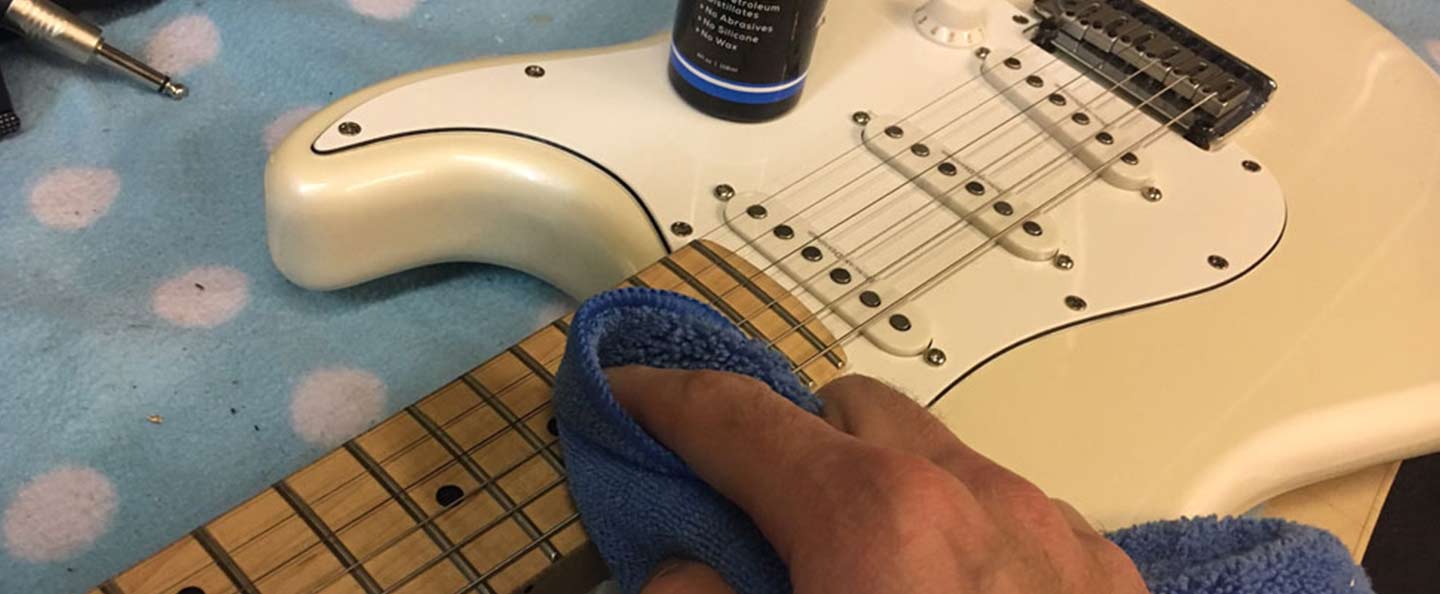
Keeping your fretboard clean is a very important part of owning a guitar. Your fingers touch the fretboard constantly whilst you’re playing and it’s the fretboard's job to soak up all the sweat and oil from your hands. Layers of dust can also accumulate and work their way into the wood if you don’t clean your guitar, eventually causing permanent damage. Keep the fretboard clean and you’re going to enjoy better playability in the long-run.
There are different types of tonewoods used for fretboards, so we’ve compiled a few quick tips to help you clean each style.
How to clean Maple fretboards
Maple fretboards are quite hard-wearing and unlike Rosewood, Ebony and Pau Ferro tend to be lacquered. This means you have to be careful with what you clean it with and how you do it.
If the Maple fretboard is finished with a lacquer (has a shiny effect) then you can only use a dry or slightly damp microfibre cloth. If you use any abrasives you risk destroying the lacquer and the integrity of the finish. Just gently rub the cloth against the dirt, doing each fret separately. The gunk will soon come off. This helps you remove any dirt with damaging the fretboard.
If your Maple fretboard is unfinished, you can use a very fine abrasive like ultra-fine steel wool, however be very careful and only do this if your guitar has lots of gunk. If you keep on top of it and clean your guitar neck regularly with a slightly damp or dry cloth, you shouldn’t need to use the steel wool.
How To Clean Rosewood, Ebony And Pau Ferro Fretboards
Darker tonewoods such as Rosewood, Ebony and Pau Ferro fretboards are always unfinished, thus the wood grain is often exposed and can start to accumulate gunk after a while. This is natural and as you play the guitar it will eventually start to discolour more. However, you can still maintain a clean Rosewood fretboard by gently rubbing the excess gunk off with very fine steel wool or a slight damp or dry cloth. You can even use a toothbrush if you don’t want to use steel wool.
One thing to note is that you need to condition a Rosewood, Ebony and Pau Ferro fretboard every few months to ensure it lasts a lifetime. This helps to re-hydrate the fretboard and stop it from cracking.
We recommend lemon oil as it effectively rejuvenates the fretboard and protects it from dirt at the same time. Just remove the strings, put a small amount on a cloth and massage it into the fretboard. You need about a half centimetre blob for every 5-7 frets. A little goes a long way!
How To Clean Electric Guitar Tuning Pegs, Bridges & Hardware
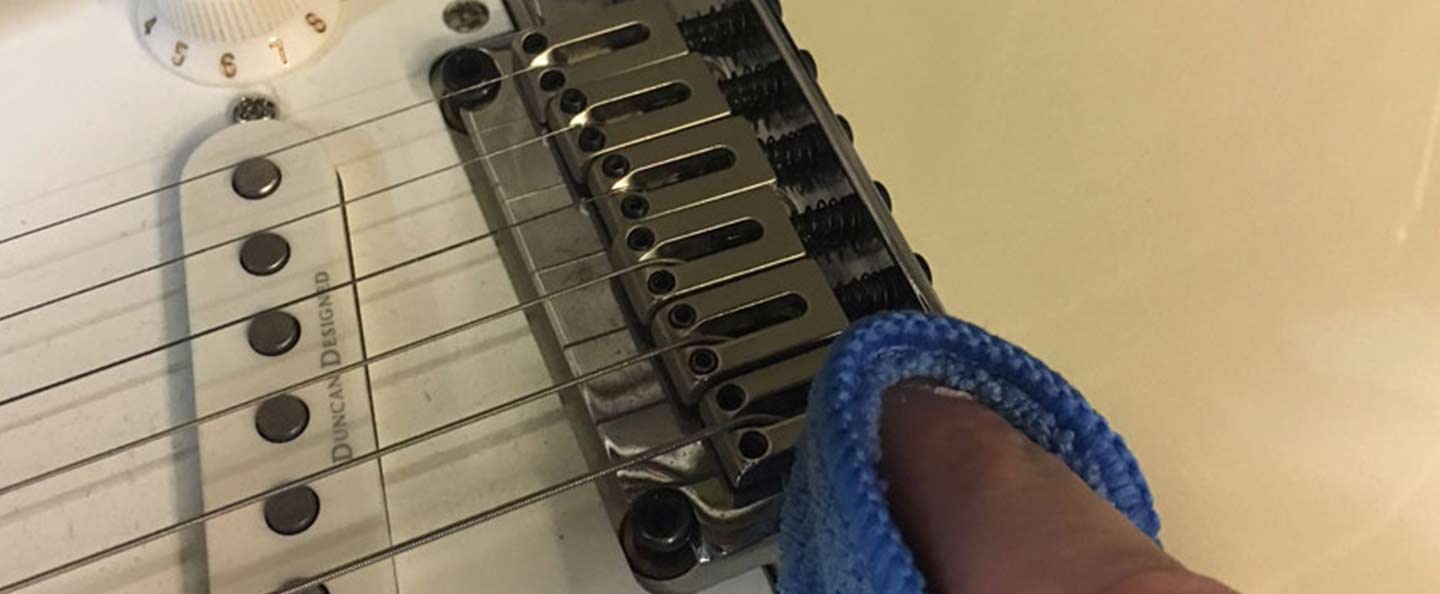
Guitar hardware often gets overlooked when we’re cleaning our guitars. So it’s important that we clean the guitar bridge, pickups and tuning pegs from time to time as this stops corrosion and keeps our guitar looking fresh.
You should use guitar polish, NOT conditioner, to clean guitar hardware as polish won’t contain any corrosive chemicals, helping you get the shine back and removing any gunk. Conditioner will clog hardware up, so don’t use that. Simply spray a little cleaner on your microfibre cloth and gently rub away any gunk. We recommend the likes of the Boss Guitar Detailer as it’s easy to use and really effective.
If you have particularly tough rust or gunk settling in to your hardware, you could use a metal polish to clear it up with a toothbrush, but we’d advise being very careful with this as it may seep into the electronics. Just remove the hardware from the guitar first and allow it to dry out after you’ve cleaned it with a metal polish such as WD-40, or take it to a luthier/guitar tech to clean if you don’t feel confident taking your guitar apart.
If you’re wondering how to clean guitar pickups, there’s a not a lot you need to do. Avoid any liquid cleaners as they might seep into the electronics and just wipe down with a dry cloth. If you have to, spray a little guitar body cleaner on a cloth and make small circles on the pickup covers or use a dry toothbrush on uncovered pickups very gently to remove dust and grime. DO NOT spray directly on the pickups!
How To Clean An Electric Guitar Body
ou should take the time to polish the body of your guitar from time to time as this will undoubtedly pick up dirt, scratches and sweat over time.
Most guitars these days have either a Nitrocellulose finish, Polyurethane finish or on some occasions a Satin or Matte finish. The latter style, Matte/Satin need extra care as the wood is often porous so you need a different approach.
How to Clean Nitrocellulose and Polyurethane Guitar finishes
We’ll start with how to clean Nitrocellulose and Polyurethane finishes first. These types of finish can be cleaned with a slightly damp cloth or dry cloth – it’s up to you. However, we’d definitely recommend the likes of the BOSS BGD-01 Guitar Detailer or Dunlop Formula 65 Guitar Polish & Cleaner as these have been designed specifically to clean a guitar body without damaging the finish. Don’t use lemon oil or furniture polish on the finish of your guitar as the harmful chemicals may make it into the wood degrading the finish.
Simply spray a little on your microfibre cloth and gently rub it in to the finish in circular motions. Don't press too hard - you just want to massage it in, rather than scrub. This will help clear away debris and ensure your finish is shiny and clean.
If you have a poly style guitar that you want to polish, adding some wax along the way, we recommend using the Dunlop P65CP1 Platinum 65 Guitar Cleaner And Polish as it adds a thin layer of wax to your finish.
How to Clean Satin & Matte finish Guitars
Satin or Matte finish guitars have been constructed without a lacquer over the top with exposed wood. If you spray cleaner or polish over the top it will clog the pores and start to become unsightly, eventually affecting the tone as it's like throwing a blanket over the wood.
The best way to clean a Matte or Satin finish guitar is with a dry cloth. Don’t use any liquid as it will seep into the pores. These guitars are designed to become stained over time adding a personal look to your guitar that reflects on how much you play it. So just enjoy the process and wipe it down after use with a microfibre cloth. If you absolutely have to use a cleaner, use something without ammonia, alcohol and wax.
Gently rub away any debris in curcular motions, again, using a microfibre cloth. If you use a lint free cloth there's no chance of pieces of material getting in the cracks!
How To Clean An Acoustic Guitar Fretboard And Body
You’re likely to find most acoustics have a Rosewood or darker tonewood fretboard, rather than Maple so you can use the same methods as cleaning an electric guitar fretboard. Use Lemon Oil where necessary and make sure you use it sparingly as you don’t want to saturate the guitar! A good rule of thumb is 2 drops per 4-5 frets. Massage it gently into each fret by covering an index finger with the cloth and then rubbing the cloth back and forth across the 5 frets.
Acoustic bodies are often satin or matte finish, but can sometimes have a gloss on them. The same goes for cleaning these. Use the correct cleaner (or none at all) for the guitar based on the rule of thumb when it comes to electric; no finish = no cleaner!
How To Clean Guitar Strings
This is a touchy subject with guitarists as some people (like me) think that as soon as your guitar strings start to become gunky you need to change them! However, some people like the feel and sound of “played-in” strings.
Now one of the major downsides of dirty strings is the fact the dirt then transfers to the fretboard and then we’re back to square one with cleaning. So, the solution here is to wipe down your guitar strings with a dry microfibre or lint free cloth after use. Slide your whole hand covered in the cloth up and down the fretboard and then pinch each string between your thumb and index finger, sliding up and down again. This will help remove dirt and prolong the life of your strings.
You can also use Fast Fret or Planet Waves XLR8 String Lubricant/cleaner to clean your strings and maintain the slick feel of new strings. This stuff also helps condition your fretboard so it’s win-win. Use as much or as little as you want. Simply glide the stick across the string and you’re good to go!
We hope you've enjoyed our how to clean a guitar and how to clean a guitar fretboard guide - let us know if you think we've missed anything in the comments below. Be sure to check out our ideal guitar humidity and temperature levels blog too, so you know how to safely store your guitar.
Shop a full range of guitar accessories including guitar cleaning kits and guitar polish over at PMT online or call in to your local PMT store to pick some up today!

